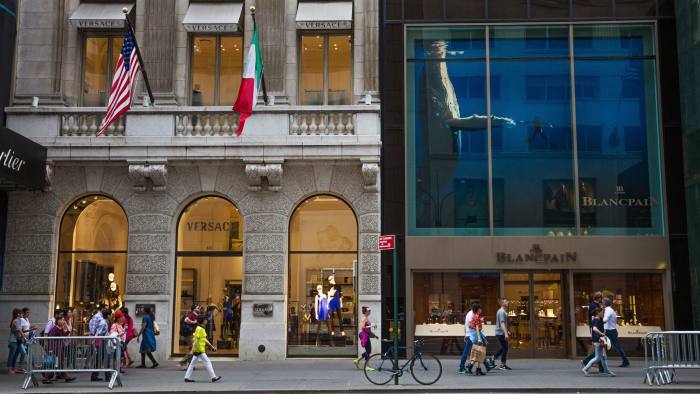US bank earnings show the wealthy are gorging on credit
Loan portfolios are growing on the back of a strong economy and soaring financial markets
Peter Atwater

Fifth Avenue, New York. Fuelled by abundant low-cost debt, the wealthy have driven luxury markets to record prices © Dreamstime
The rich really are different after all. That was the message this week as US banks and brokerages released their latest quarterly earnings. Where lending to consumers and companies is now moderating, credit to the financial elite remains strong. JPMorgan reported 12 per cent year-on-year loan growth for its wealth and asset management division, while the comparable division at Morgan Stanley reported a 7 per cent gain.
Thanks to the rapid growth in private client lending, JPMorgan has now lent out almost as much to a small number of its elite customers as it has to its millions of cardholders. To put that into perspective, just nine years ago the bank had $5 out to cardholders for every $1 lent to its private clients.
Where the availability of credit to Main Street has been limited — if not reduced — since the housing crisis a decade ago, for those on Easy Street it has never been better. The strong growth in private credit reflects the relative confidence of the wealthy and their lenders.
With widespread certainty that all this debt can be repaid, the risk of a big surprise is high. In the financial markets, universally believed truths have a funny way of being proved false. Ten years ago, banks learnt that the hard way when homeowners showed they do not always pay their mortgages first.
While the volume of high-net-worth credit is not a systemic risk, as housing credit was, losses are likely to be far greater than either the lenders or their regulators imagine. Loan portfolios are growing rapidly, on the back of a strong economy and soaring markets. But when those conditions reverse, so too will loan quality.
The banks, though, will not be the only ones to suffer. Consider how much the wealthy have driven the post-crisis recovery. In New York, for example, there is now a cluster of pencil-thin, super-tall skyscrapers at the southern end of Central Park, known as Billionaires’ Row, that did not exist before the crisis. In Los Angeles, there is a 157-acre residential property for sale for $1bn.
While those are extreme examples, the luxury market in this economic cycle has been especially strong. Fuelled by abundant low-cost debt, the wealthy have driven markets in real estate, watercraft, art and other collectibles to record prices.
Then there is the stock market itself. “Investments” represent the ultimate “luxury goods”. Our demand for investments increase more than proportionally as our income rises — and for the very wealthy, it does so dramatically. Net worth, like yacht length, is a measuring tool of status.
The danger is that no one will want stocks at the bottom of the next crisis, just as no one will want big homes and big boats. Just as consumers no longer saw their homes as investments after the banking crisis, the wealthy will not see stocks as a viable investment either.
For the individuals and lenders now caught up in the swirling virtuous cycle of ever higher asset values, the notion of a simultaneous collapse of all luxury goods markets must seem laughable. The dramatic growth in outstanding loans during the past decade, however, suggests that such an outcome is not just likely, but highly probable. Credit weaves both inter-connectedness and interdependence. When the drop comes, all will descend at once.
A decade ago, Main Street had its bubble burst. But the rich did not. The Federal Reserve and other central banks stepped in to save the financial system, and by extension, the wealthy as well.
Ironically, because of that, credit has since flowed not only disproportionately to the wealthy, but now to excess. While the rich may be different, one thing is certain: when economies slow, no one is immune from the adverse consequences of over-indebtedness.
The writer is president of Financial Insyghts and an adjunct professor at the College of William & Mary
0 comments:
Publicar un comentario